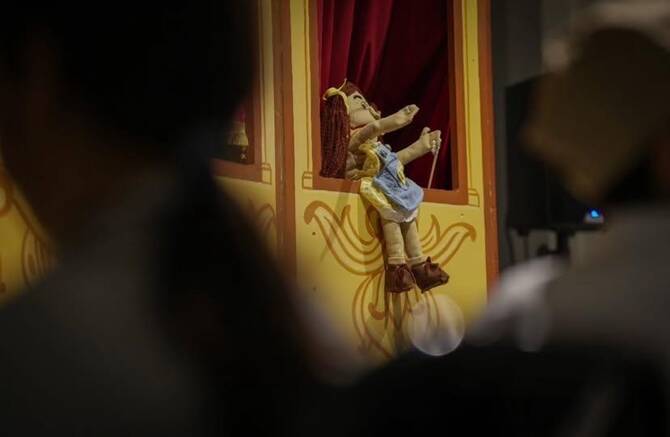RIYADH: As Saudi Arabia welcomes the Eid Al-Fitr holiday, the Kingdom is filled with excitement.
Beyond the traditional sweets, family visits, and cultural customs, one timeless form of storytelling is stealing the spotlight — the theater.
During Eid, theater in Saudi Arabia becomes a space for joy, connection and cultural expression. Throughout the Kingdom, families flock to stage productions that turn shared laughter into a celebration of identity.
“I’m reminded of the famous saying: ‘Give me bread and a stage, and I will give you a civilized nation,’” said Raghad Abdulrahman, a Saudi playwright, poet and member of Kaif Theater.
For Abdulrahman, theater offers a platform to put Saudi heritage, values and stories on show — something she believes is both urgent and long overdue.
“We have a rich cultural history that deserves to be translated and brought to life on stage,” she said. “As Peter Brook once said, theater is a medium of communication between people and cultures. And our culture has so much to say.”
Theater in the Gulf has long had a strong link to Eid. For decades, Eid celebrations included stage performances — comedies, dramas and musicals that reflect the mood of the season. While theater is part of the broader cultural fabric year round, its presence becomes especially vibrant during Eid.
“This connection runs deep in our Gulf heritage,” Abdulrahman said. “It’s how we’ve always translated joy on to the stage.”
This year, two major performances are scheduled in Riyadh: “Al-Shanta” by Nasser Al-Qasabi and “Maskoon Layla” by Hassan Al-Balam, both taking place on the third day of Eid. Kaif Theater has enjoyed significant success with its own Eid productions, such as “Haya Khallik” and “Majlis Al-Shoqaq,” which drew enthusiastic crowds.
“To me, theater feels like the family member who’s always traveling but returns for Eid — carrying gifts and joy,” Abdulrahman said. “It throws its doors wide open, welcoming guests with open arms and sharing wonder and happiness.”
She described the experience vividly: the presence of a live audience, spontaneous laughter, thunderous applause, and the joy of seeing art unfold right before your eyes — without the filter of a screen.
“You feel the laughter around you. You see the joy of Eid in the children’s sweets and new clothes, the smiles and elegance of the adults,” she said. “The stage becomes a living celebration.”
Unlike commercial productions driven by big budgets and special effects, Kaif Theater puts its trust in raw human energy. “A single performer, if sincere and committed, can hold the attention of an entire room,” Abdulrahman said.
The group invests heavily in nurturing local talent. Through initiatives such as Shaghaf — which was recognized by the Saudi Society for Culture and Arts in Jeddah — Kaif Theater provides intensive three-month training in all aspects of stagecraft.
“Our workshops cover everything: writing, acting, puppet theater, and production,” she said. “All led by seasoned professionals who know the field inside and out.”
The magic of theater begins with the written word — but it does not end there. According to Abdulrahman, a strong theatrical script is built from several essential elements. “It starts with the seed — the central idea or message,” she said. “Then the plot takes shape, building from beginning to climax to resolution.”
Characters are shaped by their conflicts, and dialogue becomes the lifeblood of the script. “In theater, dialogue moves the story,” she added. “It’s what makes a play feel alive.”
But these elements need a home. “Every play must be framed in a specific time and place — its setting, costumes, language and atmosphere matter just as much as its words,” she said. A theater director then oversees all aspects of staging: guiding performances, blocking movement, and ensuring the flow remains sharp and engaging.
Still, the transition from page to stage presents unique challenges. “Not every idea that works on paper succeeds on stage,” Abdulrahman admitted. “Some scenes require adjustments, others need visual reinforcement. The biggest test is finding which parts can come alive — and which need reshaping.”
Another challenge is to maintain balance. “If a play leans too heavily on dialogue, it risks becoming dull,” she said. “But if it relies too much on movement, it loses its narrative voice. The rhythm must be alive — neither too slow nor overly flashy.”
In an age of commercial entertainment, where box-office numbers often drive production choices, Kaif Theater is grounded in a different philosophy. “Creativity is what drives success,” Abdulrahman said. “When the script is strong, the performance sincere, and the experience meaningful — audiences return. And when they come back, they bring others.”
For her, the key is offering people something worth experiencing again. “If the audience trusts what you create, they’ll invest in it. Commercial success isn’t the goal — it’s the outcome of doing theater the right way.”
As the Kingdom drives its cultural transformation, initiatives such as Kaif Theater show just how vital live performance has become to Saudi life.
In the words of Abdulrahman: “Theater shares your sorrow, so it lessens — and shares your joy, so it grows.”


































